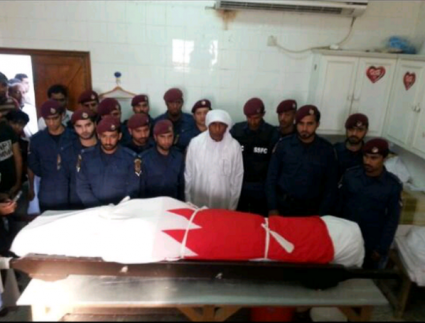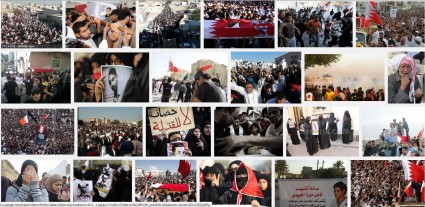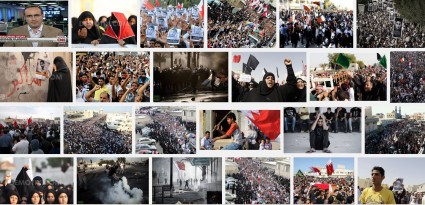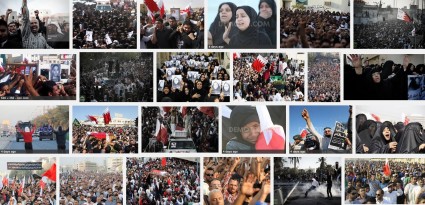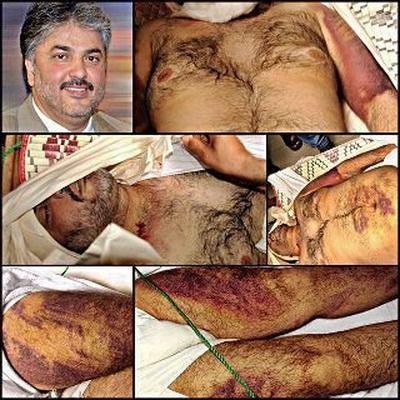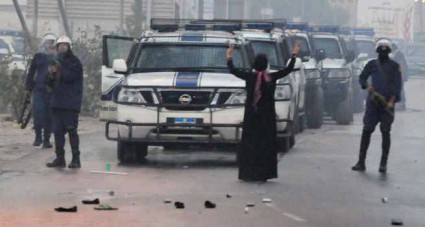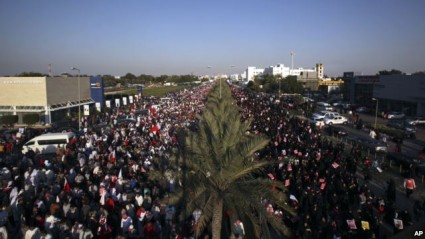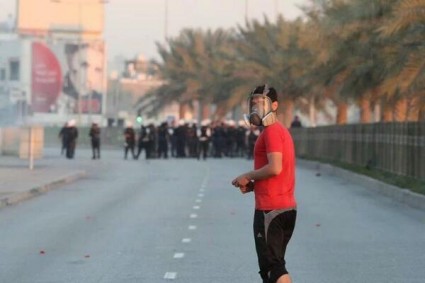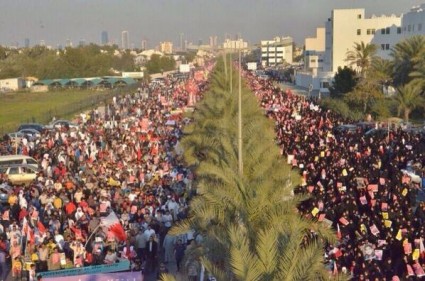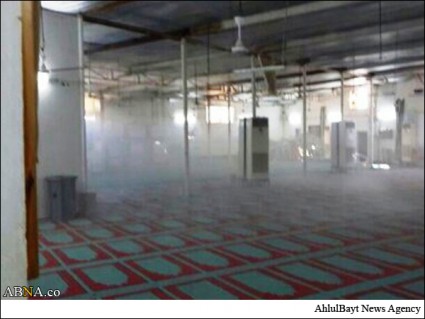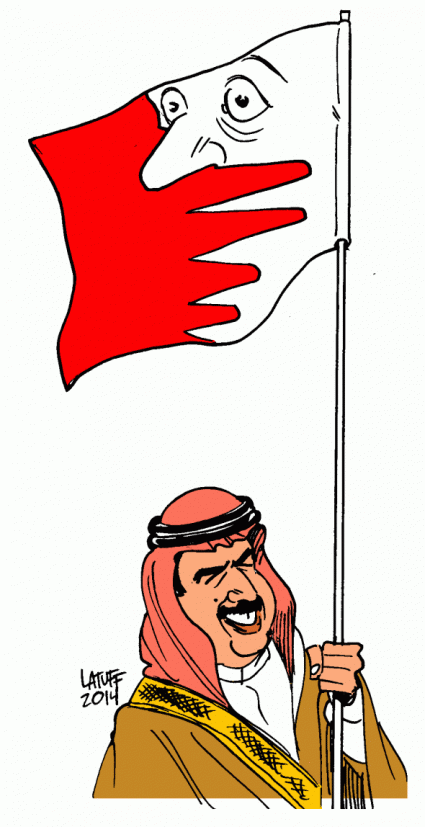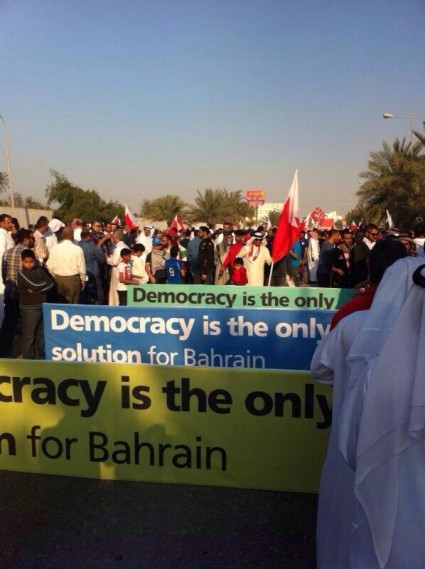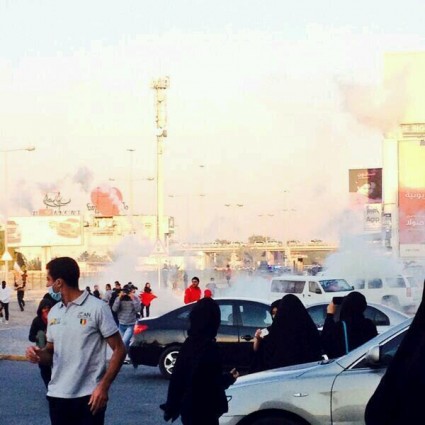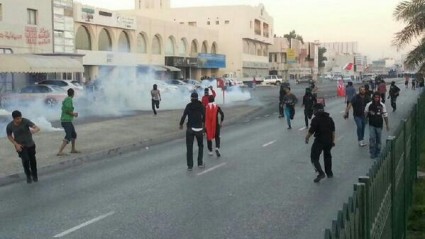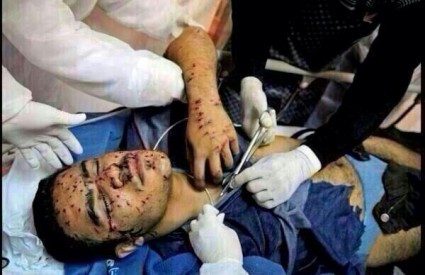Insulting the King – Crushing Oppostional Voices and Bahrain’s Roller-coaster Scourage of Injustice
Bahrain: A Poet And A Journalist: Latest 2 Victims Of Criminalizing Freedom Of Expression Under The Pretext Of Insulting The King
16 February, 2014 – Bahrain Center for Human Rights
The Bahrain Center for Human Rights expresses its deep concern for the continued criminalization of freedom of opinion and expression in Bahrain under implausible pretexts such as the charge of ‘insulting the King’. In this context, the poet Ayat Al-Qurmuzi was interrogated regarding one of her poems, and the journalist Abbas Al-Murshid was summoned to court.
On 3 February 2014, the Bahraini poet Ayat Al-Qurmuzi (23 years old) was summoned for interrogation at the Central Governorate Police Station regarding a poem[i] she recited on 24 January 2014 at an opposition rally in the area of Sitra. The poet said that the interrogators, who were a male and a female police officers had asked her about the ‘meanings of the verses and people or bodies intended by them’, while no name, person or body was mentioned in the poem which generally addressed injustice.[ii] The lawyer was not permitted access to the interrogation room although she was present at the police station. The poet was charged with two accusations ‘insulting the King and incitement to hatred against the ruling regime’ before she was released and after signing a pledge to appear before the police station upon request and with referring the case to the Public Prosecution. Worth mentioning, the complaint against the poet Ayat Al-Qurmuzi came as an order from the Office of the Deputy of Public Security.
The Bahraini poet Ayat Al-Qurmuzi had faced arrest in March 2011 on the background of the poems she recited amid the public gathering in Pearl Roundabout in February 2011, she was sentenced to a year in prison in June 2011 by a military trial, however she was released in July in 2011 under massive pressure from human rights organizations. Al-Qurmuzi stated after her release that she was subjected to torture[iii] and maltreatment during her arrest by officers, one of them is a member of the ruling family named Noura Al-Khalifa. Although a show trial had taken place for the officer Noura Al-Khalifa on the charge of ‘assaulting the integrity of the body of (torturing) Ayat Al-Qurmuzi’ since 2012, yet a verdict has not been made in the case so far. …more
A young Bahraini woman who was arrested after reciting an anti-government poem to demonstrators in the Gulf kingdom said she was beaten, electrocuted and threatened with sexual assault while in custody. Miss al-Qurmezi, a member of the Shia majority who was at teacher training college when the protests began in February, was filmed reciting poems to a huge crowd at Pearl Roundabout, the epicentre of the demonstrations
Bahraini woman poet tells of torture while in custody
By Richard Spencer – 14 July, 2011
Ayat al-Qurmezi, 20, became one of the symbols of the protests that hit the centre of the Bahraini capital, Manama in February and March. After she was arrested, reports circulated that she had been whipped and even at one point raped and killed, leading to an improvement in her conditions and her release on Wednesday evening.
Greeted by a crowd of hundreds of people at her home, she told her family she had not been sexually assault but threatened as well as being electrocuted with clips attached to her face.
She also denied that she had committed treason by attacking the king, saying she wanted reform not revolution. “The demand isn’t to overthrow the regime, but we want a real constitutional monarchy,” she said to reporters.
Miss al-Qurmezi, a member of the Shia majority who was at teacher training college when the protests began in February, was filmed reciting poems to a huge crowd at Pearl Roundabout, the epicentre of the demonstrations.
One featured a conversation between Satan and King Hamad in which they outlined the complaints of the opposition, mostly Shia calling for the Sunni royal family and elite to share power. …more
February 17, 2014 Add Comments
Bahrain: Sad Dead Policeman – but Really, Who’s Counting?
February 17, 2014 Add Comments
Prince Charles Should Punch Kings in Face over Human Rights Abuses During Qatar, Saudi Arabia Tour
Prince Charles Must be Brave and Tackle Human Rights Abuses During Qatar and Saudi Arabia Tour
By Eleanor Blatchley – 17 February, 2014
Prince Charles is keen on charity. He has personally founded 17 charities working for better education and better opportunities for British youth, responsible business, and a sustainable environment. He is also a passionate advocate of inter-faith dialogue. At a well-publicised Christmas reception, he stated that “an emphasis on love of neighbour and doing to others as we would have them do to us are the ultimate foundations of truth, justice, compassion and human rights”.
These are commendable principles. Will the Prince actively promote them when he travels to Saudi Arabia and Qatar on an official visit next Monday? Or when it comes to his reported friendship with King Abdullah bin Abdulaziz Al Saud, ruler of Saudi Arabia and Sheikh Tamim bin Hamad bin Khalifa Al Thani, the Emir of Qatar, will these values be eclipsed by efforts to advance arms deals and commercial contracts?
“The Prince of Wales’s return to the region, only one year after his last visit, demonstrates the importance the British Government places on its association with key partners in the area,” said Sir John Jenkins, the UK’s ambassador to Saudi Arabia. Sir John went on to say that Prince Charles will advocate interfaith understanding and that he and King Abdullah share a deep concern about the “enormous turmoil and human agony in the Middle East”.
But does that concern extend to the prominent Saudi human rights activists sentenced to long prison terms on account of their peaceful activism, or to Saudi women and girls subject to systematic discrimination, or to the millions of foreign workers, some of them living in conditions of forced servitude? Let’s hope Their Royal Highnesses also discuss the agony of the 64 people reportedly executed in Saudi Arabia between January and November 2013, mostly by public beheading.
According to Ambassador Nick Hopton, the Qatar visit is “an opportunity to showcase the strong ties between the UK and Qatar, which we value greatly”. Will the Prince also use it as an opportunity to raise the plight of migrant workers? The timing would be opportune – only this week the Government’s Qatar Supreme Committee released its Workers’ Welfare Standards in a credible attempt to rectify the shockingly poor conditions for migrant workers building the 2022 World Cup stadiums. Consistent with his commitment to responsible business, the Prince should suggest to the Emir that, while a good start, the new measures fall well short of the reforms that Qatar’s low-paid and routinely exploited migrant workers need so badly. …more
February 17, 2014 Add Comments
Lessons from Bahrain – Morocco police beat Pro-independence Protests in front of British MPs
Morocco police beat Sahrawi protesters as British MPs visit: NGO
17 February, 2014 – Al Akhbar
Plainclothes Moroccan police violently broke up a peaceful pro-independence protest in the Western Sahara city of Laayoune after a visit by a British MP, a prominent Moroccan rights group said Monday.
About 100 activists, including women, gathered on Saturday evening in the neighborhood of Maatallah, despite police efforts to block the protest, according to Hamoud Iguilid from the Moroccan Association of Human Rights (AMDH).
“All the citizens who tried to protest were attacked by the police, and especially plainclothes police,” he told AFP, speaking by phone from Laayoune, adding that he had not been informed of any serious injuries.
The protesters were demanding the release of political prisoners and an extension of the UN peacekeeping force’s mandate to include human rights monitoring.
They were attacked after a car carrying British MP Jeremy Corbyn and a member of the AMDH had left the area, Iguilid said.
Corbyn chairs a British parliamentary group dedicated to raising concerns about Western Sahara, and he was visiting the region with a delegation of British politicians and a rights campaigner.
Moroccan authorities could not immediately be reached for comment.
The deputy regional director of Human Rights Watch, Eric Goldstein, who was in Laayoune at the time, confirmed that more than 100 uniformed and plainclothes police had tried to prevent the protest.
“Twice as I tried to approach, plainclothes officers turned me back ‘for my own protection,'” Goldstein said, adding that the governor of Laayoune later accused the visiting British delegation of trying to incite the protesters to riot.
Morocco controls most of Western Sahara, which it began annexing in 1975 in a move never recognized by the international community, and which it considers an integral part of its territory. …more
February 17, 2014 Add Comments
Videos, Photos Offer Evidence of Press Corruption by Gross Understimation of Protest Size in Bahrain
The Western Press has deliberately underestimated the size of Bahrain Anniversary Protest. They have consistently reported the crowd size at 10s of thousands, when photo evidence suggests crowds in the 100s of thousands. This is an indication that Al Khalifa Public Relations Dollars have effectively bought “Western Media” outlets to “contrive a false reality” about the Situation Bahrain. Phlipn Out.
February 17, 2014 Add Comments
3 Years Unmitigated Human Rights Abuse – OHCHR to Affirm it’s committment to Al Khalifa’s Charade
And the Bullshit just keeps coming and the UN Continues the Charade
Switzerland read the following joint statement on the opening day of the 24th Session of the Human Rights Council on behalf of 47 co-sponsoring countries including the United States.
24th Session of the Human Rights Council
Item 2 – General Debate
Joint Statement on the OHCHR and the human rights situation in Bahrain
Geneva, 9 September 2013
Mr. President, I have the honour to make this statement on the OHCHR and the human rights situation in Bahrain on behalf of Albania, Andorra, Australia, Austria, Belgium, Bosnia and Herzegovina, Botswana, Brazil, Bulgaria, Chile, Costa Rica, Croatia, Cyprus, Czech Republic, Denmark, Estonia, Finland, France, Germany, Greece, Hungary, Iceland, Italy, Ireland, Latvia, Liechtenstein, Lithuania, Luxembourg, Macedonia, Malta, Mexico, Monaco, Montenegro, Netherlands, Norway, Poland, Portugal, Romania, Serbia, Slovak Republic, Slovenia, Spain, Sweden, Switzerland, United Kingdom, the United States of America and Uruguay.
We take note of positive steps taken by the Government of Bahrain to implement the recommendations of the Bahrain Independent Commission of Inquiry in order to improve the human rights situation in Bahrain. In particular, we note with appreciation the creation of the Office of the Police Ombudsman for the Ministry of Interior in August 2012 and its official launch in July 2013. We also note the creation of the Special Investigation Unit in the Public Prosecution Office in February 2012. We urge these institutions to proactively fulfil their mandate and encourage the Government of Bahrain to uphold its commitment to these institutions and their independence. We commend the continuation of the National Consensus Dialogue in August 2013 and encourage all sides to participate in a constructive and genuine way. We encourage the Government of Bahrain to continue to work with all participants in the Dialogue towards an open, democratic and inclusive society with equal opportunities for all.
However, the human rights situation in Bahrain remains an issue of serious concern to us. In particular, we share the concerns expressed by the OHCHR regarding the 22 recommendations made by the National Assembly of Bahrain on 28 July 2013. Any new legislation to implement these recommendations must meet international standards and ensure human rights are protected. We are also particularly concerned by the ongoing violation of the rights to freedom of peaceful assembly and association and the repression of demonstrations. We expect officials and protestors to refrain from any violence. Furthermore, we continue to be concerned about the continued harassment and imprisonment of persons exercising their rights to freedom of opinion and expression, including of human rights defenders. We are also concerned about the cases of revocation of nationality without due process, some of which might lead to statelessness. Lastly, we are concerned that those alleged to have committed human rights violations are often not held accountable.
We call upon the Government of Bahrain to address these concerns and expedite the implementation of the recommendations received from the Bahrain Independent Commission of Inquiry and the recommendations Bahrain agreed to accept through the Universal Periodic Review. We urge the Government of Bahrain to enhance its cooperation with the OHCHR and allow for a fully comprehensive collaboration, including accepting an OHCHR follow-up mission. We also urge the Government of Bahrain to cooperate with the Special Procedures of the Human Rights Council, in particular the Special Rapporteur on torture, the Special Rapporteur on the right to freedom of peaceful assembly and of association and the Special Rapporteur on the situation of human rights defenders, together with any other Special Procedures that request to visit Bahrain and reschedule previously planned visits. Lastly, we encourage the Government of Bahrain to fulfil its obligation to submit its outstanding reports to the treaty bodies of the human rights conventions it has ratified.
We will continue to follow closely the human rights situation in Bahrain and invite the OHCHR, Special Procedures and the Human Rights Council to do so. We also invite the Government of Bahrain to further engage with the Human Rights Council. Thank you Mr. President. …source
February 17, 2014 Add Comments
3 Years of Rape, Torture, Murder, Gassing, Police Impunity, is Retalitation Against Police Surpirse?
February 17, 2014 Add Comments
Will OHCHR Demand Justice for Karim Fakhrawi, Assassinated Co-founder of Newspaper Al-Wasat?
February 17, 2014 Add Comments
Defiance Stands Her Ground; “One year of prison is nothing, We have a cause… This will not stop us.”
Activist Zainab al-Khawaja, jailed daughter of Bahraini human rights activist, Abdulhadi al-Khawaja, freed
By REEM KHALIFA – Associated Press – 16 February, 2014
MANAMA, Bahrain (AP) — Bahraini activist Zainab al-Khawaja was released from prison on Sunday after nearly a year behind bars for multiple convictions including participation in an illegal gathering.
Friends and supporters greeted her in a coffee shop in a main mall hours after her release. The cafe has served as a gathering point for activists since the small island-nation’s Arab Spring-inspired uprising.
“One year of prison is nothing,” she told journalists defiantly after her release. “We have a cause… This will not stop us.”
Bahrain’s majority Shiites have led a three-year uprising seeking a greater political voice in the Sunni-ruled Gulf kingdom, which is home to the US Navy’s 5th Fleet.
Al-Khawaja, who is popular online and on Twitter, said international attention should focus on an estimated 3,000 prisoners believed to be behind bars in Bahrain on politically related charges.
Her father is prominent human rights activist Abdulhadi al-Khawaja, who is among several opposition figures who are serving life sentences. He drew attention to his imprisonment with a lengthy hunger strike in 2012.
Her lawyer Mohammed al-Wasti said she still faces two trials, one this month and one next month, on charges that include damaging police property, defacing a picture of Bahrain’s king and insulting a police officer. …source
February 17, 2014 Add Comments
OHCHR to Affirm Bahrain Progress on Human Rights, Chide Short Falls, leave it to return to Status Quo
NIHR welcomes OHCHR’s visit to Bahrain
15 February,, 2014 –
Manama, Feb. 14. (BNA) – The National Institution for Human Rights (NIHR) has welcomed the visit of the delegation of the UN Office of the High Commissioner for Human Rights (OHCHR) to Bahrain next Wednesday, and called upon all concerned ministries and NGOs to cooperate with it in order to assume its duties.
This came as an NIHR delegation, led by NIHR Deputy Chairman and Chairman of its Complaints, Monitoring and Follow-up Committee Abdulla Ahmed Al-Derazi, currently on a visit to Geneva to take part in discussing Bahrain’s third report before the 75th meeting of the Committee on the Elimination of Discrimination against Women (CEDAW), held a meeting with a number of OHCHR officials.
Al-Derazi said that the meeting was in line with NIHR’s keenness to cooperate and communicate with international human rights bodies, especially those of the UN, in order to enhance efforts to protect human rights.
He affirmed that the NIHR is looking forward to consolidating its cooperation with those bodies in order to benefit from their expertise to enhance its achievements in the human rights field.
He briefed the OHCHR delegation about the role and work mechanisms of the NIHR.
Members of the OHCHR delegation expressed keenness on enhancing cooperation with the NIHR, praising its role in promoting and protecting human rights in Bahrain. …source
February 17, 2014 Add Comments
Revolutionary Youth – Insights from Stuart Hall’s Revolutionary Legacy
Hall’s work in cultural studies offers unique insight into the role of the youth in the Arab revolutions.
Stuart Hall’s revolutionary legacy
16 February, 2014 – Mark LeVine – AlJazeera
Of all the insights offered by the seminal Jamaican-British cultural theorist Stuart Hall, who passed away on February 10 this year, one of the most relevant for anyone concerned about the Arab world today was his argument that “identities are an endless, unfinished conversation.” It’s hard to think of a better summary of why the revolutions that started with so much hope across the Arab world in the winter of 2010-2011 have had such a hard time producing a positive outcome.
It’s not merely that elites and the systems that have long protected them remain too powerful for their peoples to bring down. It’s that in this long but still liminal historical post-Cold War moment, precisely what kind of “people” Egyptians, Moroccans, Libyans, Bahrainis and others want collectively to be remains very much undecided.
Stuart Hall is perhaps the best known exponent of the academic discipline of cultural studies, which emerged in the post-war era, first in the UK, then in the US and soon after that globally as one of the most important approaches to studying contemporary societies. From his early days with the New Left Review and then at the Centre for Contemporary Cultural Studies in Birmingham and the Open University, Hall’s research studied how and why political and economic systems retain the consent of societies, even when their policies do not serve their economic or political interests.
Of all the disciplines that emerged out of Karl Marx’s economic and historiographic theories, none could claim to have taken his call for schools not merely to interpret the world but openly to change it with and through the knowledge they produce as has cultural studies. Of course, whether or not they want or are willing to admit it, all scholars are engaged in the business of transforming the world, or at least people’s perception and experience of it. It’s just that most of the time they reinforce rather than challenge the status quo.
Recognising youth
Cultural studies’ activist roots run deep into the pre-World War II era, when studies of culture in Britain were relegated to workingmen’s associations lectures and adult education courses. It was only after the War that the burgeoning number of “youth” suddenly became a problem governments needed to address in order to manage society at large.
Building on the insights of thinkers like Antonio Gramsci and his concept of “hegemony,” Michel Foucault’s studies of the myriad ways power and knowledge flow through societies, and the seminal research of the Frankfurt School, cultural studies scholars explored emerging post-War British youth subcultures to understand how their unique sense of style, and their seemingly rebellious and threatening attitudes towards the establishment, most often reinforced rather than challenged the hegemonic political systems of the West.
From the start, cultural studies scholars understood that movements such as the Mods, Teds, hippies, punks, and hip-hoppers, all contained the potential for political action. Some even directly participated in powerful movements such as the civil rights and anti-war movements. Yet all fell prey to what Thomas Frank has so well described as the “conquest of cool” by capital – the seemingly ineluctable ability of the market to coopt, commodify and in so doing defang even the most subversive forms of popular culture.
Part of Hall’s genius was his ability to understand the relationship between the strengths and weaknesses of subcultures and the emerging global ideology and political economy of neoliberalism and neoconservatism, which he described under the rubric of “thatcherism”.
At the very moment that a neoconservative, semi-authoritarian populism was becoming politically, economically and culturally ascendant across the US and UK, Hall’s research opened up youth culture globally to investigation by scholars working in a variety of disciplines. The goal of his research was continuously to seek to make theory more relevant to practice, to provide tools for exploring popular culture that would help scholars not merely understand its dynamics, but help young people more successfully reshape their societies towards a more just and equitable future.
Sub-, counter- and revolutionary cultures
Given the importance of “youth” to any hope for political change in the Arab world (as the Carnegie Middle East Center put it not long before the outbreak of the Arab uprisings), the work Hall helped foster has opened innumerable paths to study the way culture, politics, and economics are aesthetically embedded in one another, in particular through the consumption of various forms of artistic production.
As the Arab world became more fully enmeshed in global neoliberalism and globalised Euro-American cultural norms and patterns of consumption began to penetrate the region, the need to apply the insights of cultural studies to the changes being experienced by the emerging generation of citizens became more important. The writing, was quite literally on the walls, in the soccer stadiums, in the lyrics of hiphop songs and the dark explosive sound of the local heavy metal scenes. All of these portrayed a situation far at odds with the rosy picture of countries like Tunisia and Egypt painted by the IMF and the World Bank.
Indeed, when I met the first generation of bloggers in Egypt and across the region in the 2000s, it was abundantly clear that they saw little place for themselves in the changing political-economic landscapes of their countries. They increasingly had the means to imagine, define and pursue alternative futures than the ones being – or rather, not being – laid out for them by their societies. …more
February 17, 2014 Add Comments
Bahrain Regime to UN – “Small Group of 500 Thousand Terrorists are Causing all the Shit…”
Bahrain sends letter to UN chief
16 February, 2014 – Gulf Daily News
BAHRAIN yesterday sent a letter to UN Secretary General Ban Ki-moon, highlighting the systematic campaign of terror faced by the kingdom.
Minister of State for Information Affairs and official government spokeswoman Sameera Rajab submitted the memo to United Nations Information Centre director for the Gulf Countries Nejib Friji.
It is in response to a statement made by UN spokesperson Martin Nesirky.
“We would like to remind the Secretary General that Bahrain has been confronting, for years now, a systematic terror campaign, perpetrated by a misled group directly condoned and harboured by extremist religious figures and backed by foreign parties, which provide radical ideological indoctrination, training in the use of homemade explosives and all types of weapons, which they get through smuggling, noting that Bahrain has foiled a number of dangerous smuggling operations.
“We would like to inform the Secretary General that the February 14 Coalition, which operates outside the realm of the law on opposition societies and parties, calls for civil disobedience, disrupts citizens and residents’ interests and attacks policemen with firebombs (Molotov cocktails) and homemade explosives,” the letter said.
“We would also inform Mr Ban that this same group, officially branded a terror organisation by Bahrain, had claimed responsibility for planting booby-trapped cars in public places, which caused the death of policemen and endangered citizens and residents’ safety and security.
“We would like to draw to the attention of the Secretary General that the authorities in Bahrain are dealing with these developments in accordance with the law and in full commitment to the international human rights conventions and the international human rights law.
“The authorities in Bahrain abide, with utmost transparency, by legal procedures to maintain social security and safety,” the letter said..
…source
February 16, 2014 Add Comments
If a Single Bahraini Revolutionary is this Dangerous, how Dangerous are a Few Hundred Thousand?
15 February, 2014
If One Bahraini Revolutionary is this Dangerous,
February 16, 2014 Add Comments
What Bahrainis do when they take a break after a long day of Protest
February 16, 2014 Add Comments
Bahrain Regime Grows Desperate, Night Raids, Murders, Illegal Arrests, not enough? Attack the Mosques
Bahraini Regime Attacks the Largest Shia Grand Mosque
14 February, 2014 – ABNA
(Ahlul Bayt News Agency) – The religious freedom department of Bahrain Human Rights Observatory (BHRO) has announced the attack on Imam Sadeq Grand Mosque yesterday, Friday 14thFebruary, by the regime forces.
Sheikh Maytham Alsalman, head of the religious freedom department, said that this attack is a clear evidence of the sectarian hatred spread in the official bodies and called on the international community to contribute effectively to stop the continuous and systematic violations on the mosques registered in the Jaffaria Waqf Directorate.
Alsalman said, “The religious and prestigious status of Imam Sadeq Mosque for the Bahraini Shia is obviously great; while it’s the Grand Mosque that handles the greatest Juma Prayer. Attacking the mosque with tear gas and blockading is an assault to the whole Shia denomination.”
Alsalman called on the international organizations to continue applying pressure on the authorities to stop the repetitive attacks on the mosques and Shiite worship houses; as the religious freedom department has recorded 6 violations on Shia Jaffaria mosques since the beginning of 2014. …more
February 16, 2014 Add Comments
Canada jumps in on Western Weapons Selling Freenzy to the Most Evil Regime in World History
Government touts $10 billion contract to arm Saudi Arabia amid human rights concerns
By Lee Berthiaume, Postmedia News – 14 February, 2014
OTTAWA – Canada’s defence industry has beaten out German and French competitors to win a massive contract worth at least $10 billion US to supply armoured military vehicles to Saudi Arabia.
The win was announced by International Trade Minister Ed Fast to cheering workers Friday at a factory in London, Ont., and will go a long way in bolstering the Harper government’s case for transforming Canada into a global arms dealer.
But it also raises many ethical questions that will continue to surface as Canada’s arms industry turns more and more to the volatile Middle East and South America for business.
Canada has previously sold light armoured vehicles (LAVs) like those used by Canadian soldiers in Afghanistan to Saudi Arabia, with more than 1,000 delivered to the Middle Eastern kingdom in the early 1990s, and 700 more in 2009.
But the government is touting this latest deal as the largest export contract in Canadian history, with the potential to create and sustain 3,000 jobs in southern Ontario and other parts of the country.
Exactly how many LAVs are being sold to Saudi Arabia was not being revealed, but documents filed in the U.S. by General Dynamics Land Systems – Canada, whose London-based subsidiary will be building the vehicles, put the contract at between $10 billion and $13 billion.
Defence and export industry representatives praised the Conservative government Friday for its role in securing the deal.
“This is an Olympic win for Canada and for Canadian manufacturers,” Canadian Manufacturers and Exporters president Jayson Myers said in a press release. “Like all victories, it’s been the result of a team effort in which the government has played a crucial role. All Canadians should be proud of this record achievement.”
Such government support is consistent with its plan to offset job losses and factory closures in other segments of the manufacturing sector by turning Canada’s arms industry into a global player.
Yet concerns have been previously raised about selling such military hardware to Saudi Arabia, given countless reports of human rights violations, including severe restrictions on protests and dissent, and excessive use of force when disbanding demonstrations. …more
February 16, 2014 Add Comments
US Crushing Democracy in Bahrain, Obama and Partners keep it Silent, Away, from ‘Audience’ in West
Bahrain: The silent revolution
14 February, 2014 – Al Jazeera
Muted reaction to Bahrain crackdown on pro-democracy activists is in stark contrast to those regarding Syria and Libya
Bahraini human rights activist Zainab al-Khawaja was due to be out of prison on February 20. She has been serving concurrent sentences since February 2013. However, she was recently sentenced to a further four months on a new charge of “destroying private property”.
As Bahrainis mark the third anniversary of the pro-reform protest movement which came to be known as the 14 February Coalition, human rights violations continue unabated in the country. Some 122 Bahrainis have since died from torture, lung infections caused by tear gas, and from live ammunition used by the Bahraini security forces.
Thus far, 1,300 Bahrainis have been arrested in connection with their role in the protests and those still in detention have been tortured and denied access to medical care. Hospitals have been militarised as doctors and nurses are harassed for treating victims of the protests. Thousands of workers have been dismissed or suspended from their jobs for taking part in the demonstrations.
And while the international community, particularly Western countries, have been quite vocal in condemning atrocities committed against protesters in some countries in the Middle East, when it comes to Bahrain, calls from the West for an end to human rights abuses perpetrated by the Bahraini authorities have been rather muted.
Using the ‘terror’ card
Bahrain is now on the verge of a precipice as citizens’ rights are trampled upon with no recourse to the legal system. The judiciary and police are far from independent and operate with the utmost impunity, leaving citizens who dare condemn atrocities at their mercy. Bahraini authorities ensure that they impose charges against activists and journalists which carry maximum sentences, and which, in the eyes of Bahrain’s allies, portray a country doing its best to ensure that its territorial integrity and internal security are protected from “criminals and trouble makers”.
Inside Story Americas – US double standards in Bahrain
Last year, on September 29, a court in Bahrain sentenced a group of 50 political and civil activists under the country’s terrorism law to jail terms ranging from five to 15 years, for “trying to destabilise the country”, and for alleged links to the “14 February Coalition”. The sentencing of the 50 vividly paints an appalling picture of the state of affairs in Bahrain. …more
February 16, 2014 Add Comments
Ban Ki-moon plays role as Impotent lacky for US Agenda of Killed Democracy in Bahrain
Bahrain must respect international rights obligations: UN
15 February, 2014 – pressTV
UN Secretary-General Ban Ki-moon has called on the Bahraini regime to respect its “international human rights obligations” in dealing with peaceful protests in the country.
In a Friday note to correspondents in New York City, the N chief “urged the (Bahraini) authorities to act in strict accordance with their international human rights obligations,” said a UN spokesperson, whose name was not mentioned in the report.
Ban also expressed regret that tension remains in Bahrain three years after the beginning of the popular uprising.
The UN secretary-general “called consistently on all sides in Bahrain to exercise restraint and refrain from violent acts.”
Ban said “all political constituencies and actors will need to participate freely in the dialogue for it to produce meaningful outcomes that respond to the legitimate aspirations of all Bahrainis.”
The comments came as several people were injured on Friday in an attack by regime forces on protesters marking the third anniversary of the uprising against the ruling Al Khalifa family.
Witnesses said security forces fired tear gas and birdshot to disperse the peaceful demonstrators in several towns and villages including the capital, Manama. Over two dozen demonstrators were also arrested.
The violence occurred just hours before a planned major demonstration at the iconic Pearl Square in Manama.
On February 13, Bahraini regime forces detained nearly 30 protesters in several villages around the capital on charges of “rioting and vandalism.”
Amnesty International has voiced concern that the Manama regime might launch another heavy-handed crackdown to quell the protests. …more
February 16, 2014 Add Comments
Major Stake Holders, US, UK, use Al Khalifa Regime to Quash Democracy in Bahrain
February 16, 2014 Add Comments
Since the beginning, Al Khalifa has used Black Propoganda to dispatch it’s War against Democracy
“We are heading to the final victory; and we are the ones who write the history” – Martyr Saeed Alawainati
On The Occasion of The 14 February Uprising in Bahrain
29 December, 2014 – Manama Post
Manama Post (Exclusive): Since the beginning of the February 14 revolution and to this very day, the Al-Khalifa royal family, waged black propaganda against the Bahraini nation, but we worked diligently to save this revolution from the so-called Islamic scholars who sold their honor and ethics in exchange of petrodollar. We also fought the global arrogance hypocrisy and its double standard policy in dealing with the Bahraini people revolution who struggle to gain their liberty, independence and salvation from the dark tribal dictatorship mentality, which ruled them for many long years. The fascist regime of Al-Khalifa enjoys the political support provided by the (Buckingham Palace) and the financial and military assistance of U.S. administration. Continuous U.S. military presence in Gulf is in accordance with United States global hegemony and to serve the interests of the Zionist entity and also to besiege the resistance axis in the Arab world and in the Middle East region in particular.
Today, and as the February 14 revolution approaches the completion of its third anniversary, and after many traitors tried to distort the demands of our nation , we decided to intensify our efforts in order to confront this fierce war machine ;so we must increase our revolutionary activities more than ever before. Bahraini people’s voice of oppression must be heard through the world and ‘‘The Manama Post’’ will serve in this regard. We are going to work with transparency and away from any political affiliation and we will adhere to professionalism and total neutrality in order to break the media blackout regarding the ongoing massacre perpetrated by tyrant King Hamad. One of our ambitions is to unify the revolutionary factions in the face of the Saudi occupation and King Hamad’s mercenaries.
Today, we chose this name ‘‘The Manama Post’’ to emphasis on the centrality of our revolution which started from our capital, Manama. We have this inalienable right to demonstrate peacefully as we did before when we staged sit-ins at “Martyrs’ Square – or the Pearl Roundabout,” and we added the term “Post,” which means “letter”, in the hope that we would have this opportunity to make you aware about the everyday grievances of the Bahraini nation. Even though we do not have your address to send you our ‘‘The Manama Post’’ but our every day rendezvous with you will be at ((The Freedom)).
May Almighty God Save Bahrain
February 16, 2014 Add Comments
Regime Quakes as Obama’s Greatest Fear Realised – Democracy is Coming to Bahrain
February 15, 2014 Add Comments
NGOs Report Tear gas and birdshot Mar third anniversary of Bahrain Democracy Uprising
Tear gas and birdshot mark third anniversary of Bahrain’s uprising
14 February, 2014 – IFEX
Bahraini protesters marking the third anniversary of the country’s uprising in the capital city of Manama and surrounding villages were met by security forces on 14 February 2014 with tear gas, birdshot and arrests.
Said Yousif AlMuhafdah, the acting vice president of the Bahrain Center for Human Rights, has taken to Twitter to offer the world a snapshot of the situation on the ground in Bahrain today. …more
February 15, 2014 Add Comments
Peaceful Protesters Brutalized by Police with Mil. Grade CS Gas, Birdshot across Bahrain
February 15, 2014 Add Comments
Bahrain’s Thuggish Police launch indiscriminate attacks on Businesses Serving Opposition
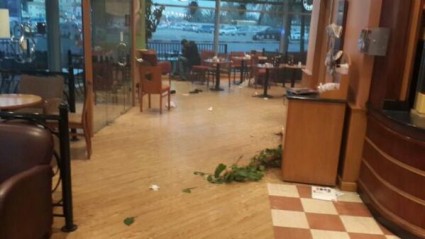 This Coffee Shop has Suffered only Minor Damages from a Scourge for Police Violence launched against businesses that serve Shia Patrons.
This Coffee Shop has Suffered only Minor Damages from a Scourge for Police Violence launched against businesses that serve Shia Patrons.
February 15, 2014 Add Comments
Bahrain Police meet “Street Justice” after 3 Years of Impuntiy for Murder, Rape, Torture
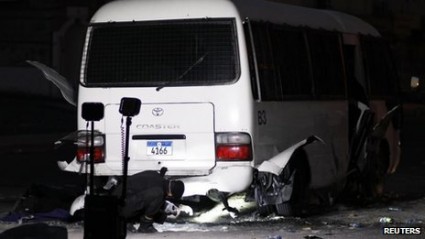 A police special unit inspects the police patrol mini bus which was hit by explosions at a police checkpoint in the village of Dih A police vehicle near the village of Dih was also hit by a blast
A police special unit inspects the police patrol mini bus which was hit by explosions at a police checkpoint in the village of Dih A police vehicle near the village of Dih was also hit by a blast
Bahrain policeman dies after protest anniversary bombing
15 February, 2014 – BBC
A police special unit inspects the police patrol mini bus which was hit by explosions at a police checkpoint in the village of Dih A police vehicle near the village of Dih was also hit by a blast
A policeman in Bahrain has died of wounds from a bomb blast during protests marking Friday’s third anniversary of the country’s uprising.
The interior ministry said he was one of two officers wounded in a “terror blast” in the village of Dair.
Another three policemen were injured by an explosion near the village of Dih.
Protesters were marking the 2011 unrest fuelled by demands for more rights and an end to discrimination against the majority Shia community.
On Friday demonstrators attempted to reach the site of a bloody crackdown on demonstrators almost three years ago.
Several demonstrators were reportedly wounded by security forces. The interior ministry said in a statement that 26 people were arrested on suspicion of “rioting and vandalism”.
Police used tear gas to stop them from reaching the Pearl Roundabout, which was a focus of protests in 2011.
Since then, police and demonstrators have scuffled almost daily. Thousands of people have been arrested.
Associated Press quoted the Bahrain Youth Society for Human Rights as saying 38 protesters had been hurt in clashes since Thursday evening, with injuries caused by birdshot fire, tear gas and beatings. …more
February 15, 2014 Add Comments

